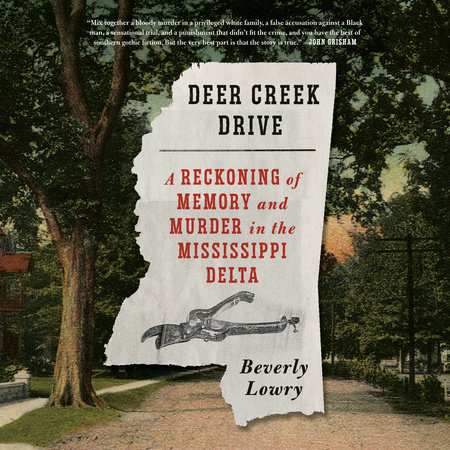
Deer Creek Drive by Beverly Lowey
Knopf ($29) Available at Square Books
Author will appear at Off Square Books on August 24 at 6 pm

A nature of violence is one of the more easily observed traits of the American South. From the wretched history of slavery into the atmospheric terror politics of Jim Crow, the restless and heightened language of writers like Hurston and Wolfe, even the very landscape, overfull with vines and trees and clay banks, colosseums for the abundant wildlife that feed the rich soil; “grotesque” is insufficient in its suggestion of stasis. Violent is the word.
Unless you are of a certain generation from the Mississippi Delta, you may not have heard of the murder trial of Ruth Thompson Dickins. It took place in Leland, Mississippi. On November 17, 1948, Ruth stabbed her elderly mother Idella Thompson over 150 times with pruning shears.
A wealthy and influential family of gentility, the Thompsons were related to doctors and law enforcement officials that served professionally on the case. Ruth’s defense was that an unknown Black man entered the house and killed her mother. Having no hard evidence to support her defense, and plenty of evidence to the contrary, Ruth Thompson Dickins was sentenced to life imprisonment. However, Dixie social politics being what they are, she only served six years in Parchman before being released. On Paper, it was an open-and-shut case, but, in reality, a bizarre example of the hypocrisy of our racist institutions, and the power of media histrionics that persist in haunting our society.
Beverly Lowry’s new book about the Thompson murder, Deer Creek Drive, is built as a clever apparatus, which is executed with all the mastery one would expect from the accomplished writer. The facts of the murder and trial are written with the tight clarity of a professional true crime author (Lowry has published great books in the genre before). But also, the elements of character examination, setting, suspense, and speech are rendered in prose befitting a literary novel; Lowry has published several of those, as well. And on top of that, the significance of the case historically, culturally, and personally is explained with the secondary material of a popular historian, and the individual testament of the memoirist.
Lowry inserts asides during the timeline of the trial, newspaper headlines and editorials, which subtly expound on the world that could allow such weird and flagrant instances of injustice. Deer Creek Drive is bookended with the author’s recollections of the time (Lowry was a child when the murder happened, and grew up a few miles away in Greenville), plus the contemporary experience of researching the case and its echoes today. In this way, Lowry avoids the meaningless sensationalism incipient in the design of most true crime books, by expanding the dimensions of the form.
Deer Creek Drive should be considered the crown jewel of Lowry’s literary career, being a culmination of four genres she has written successfully in, cut cleanly and attractively into a masterpiece of nonfiction. Beyond that, it’s an engrossing story told well. It will surely be a classic.



